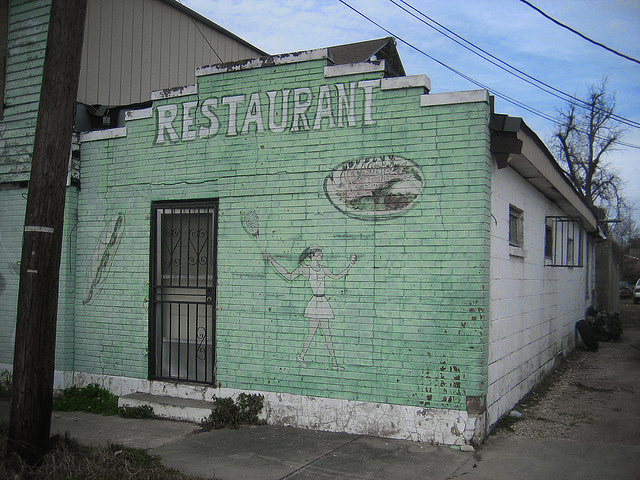Timothy S. Lane
Even the heat down here had flavor. Sort of roof-of-the-mouth thing. Not like the other flavors of this place. The salty grit of char-grilled oysters, the soft-to-soggy sweetness of beignets, or the peeling of jambalaya burn. The heat, sewn through every breath by a wicked hand, smacked of biology. Of rot and dying. Of unchecked swamp growth you could taste.
Swimming, Toby and Elise walked by abandoned buildings along a trash-strewn street.
“How much longer now?” he asked.
“Just three more blocks up, and then, well, no, yes, then five to the left,” she said.
“We turn on St. Anthony’s?”
“St. Anthony’s.”
Elise was keeping her iPhone in her purse until they reached the restaurant. Without the little blue dot edging along a bright Google map it felt as though theywere lost, or close to being lost.
They walked in Mardi Gras costumes. She wore a plastic eye-patch so cheap the thin ring of mother plastic from which it was stamped still clung to it and a brown polyester hat. It was three-cornered and meant to look weather worn, real pirate caliber, but unless properly stood up, seemed more like a soaked paper bag. A red scarf was tied gallantly around her waist—something she had been proud of only a few moments before.
He wore a large black mask. Owl’s eyes framed by looping patterns of hundreds of incandescent green glass beads, so heavy it was constantly sliding down his face so that he had to tilt his head up to see ahead. Around his neck were stacked enough plastic beads that a bullet would have trouble getting through.
They didn’t speak and the people they passed didn’t either. A small boy, no more than three or four, rode by on his bike. He kept pace with them for half a minute, scowling at Toby’s smile. Just before they passed beneath the highway, an old woman, half her hair done up in curlers, called out.
“Good morning.”
“Good morning,” Toby and Elise said.
Then, when they were underneath the overpass—sound and vibration thrumming the air—Elise said, “I can’t believe I’m wearing a fucking pirate’s costume.”
Toby propped his mask on the top of his head, elastic band catching on his ears.
“Do you think I should put this away?” She held out her small, plastic dagger, surprisingly lifelike.
“Maybe, yes.”
Elise tried to fit it in her pocket, but it wouldn’t. Instead, she carried it pressed against the side of her leg.
So now they were maybe thirteen blocks into the journey and the streets were empty. No sidewalk, every other house’s face punched in, dangle-tooth windows and splintered doors tattooed by the we-have-been-here’s—spray-paint and Magic Marker. Weeds and blown tire scraps. $70,000 cars with windows black, paint black and rims black, all of it gleaming.
“St. Anthony’s?” Toby asked.
“It shouldn’t be too much more.”
In New York there were always people upon people upon people. This, this was devastating.
“Feels like in The Wire or something,” Toby whispered.
“Well, it’s your stupid friend who recommended this place.”
They turned onto a busier street—St. Anthony’s, St. Anthony’s, St. Anthony’s—and with nowhere to walk on the side of the road, they crossed onto the median and walked there. A man rode out from an alleyway on a huge mountain bike. Sitting down he could barely reach the handlebars and on each pedal, he swerved a little. When he passed him they saw, sticking out of his jeans, matte black and big, the handle of a gun.
“Holy shit.” Toby whispered.
“Was that?”
“Should we get a cab?”
“I don’t see a cab, do you see a cab?”
“Don’t be bitchy.”
Elise started to cry, but neither of them stopped walking. The man on the bike weaved through traffic fluidly and disappeared around the far corner.
“Ellie, I’m sorry,” Toby said, and then he repeated her name like the magic word it could be. “Ellie, Ellie, Ellie, I didn’t mean. Come on. How many more blocks?”
She started crying harder, her plastic pirate sword tapping her knee with each step, her pirate hat in full paper bag mode and her plastic eye-patch—propped up on her forehead—working an angry red outline into her skin.
“I lost count,” she said.
They left the busy road and the quietness returned.
“Ellie, listen, we can turn back, or, call someone or,” Toby said, and then he almost tripped on something. Metal scattered with light sound. He bent down and picked one up. A bullet casing. One of at least 40 or 50 scattered in a pool. “I think we should really go back.”
“No, look.”
Elise was pointing her sword forward. There was a line of people who looked like them waiting to get into the restaurant that was supposed to have the best fried chicken in town.
“Come on,” Elise said.
Toby put a few of the shells into his pocket and hurried after her.
Later they met up with some friends who happened to be visiting the city at the same time they were. “You have to visit this chicken place,” Elise said. “You won’t believe the taste.”
“But check it out,” Toby said. He pulled out his three shells. “Don’t walk there. Get a cab. It’s a good story, actually. . .”
Timothy S. Lane graduated from the University of Oregon with a degree in journalism. His writing has appeared in The Good Men Project, All Things Considered, and online at Tin House. Viking/Penguin published his first novel, Rules for Becoming a Legend, in March. He currently lives with his wife in Portland, Oregon. Find him on Twitter at @timothyslane.


